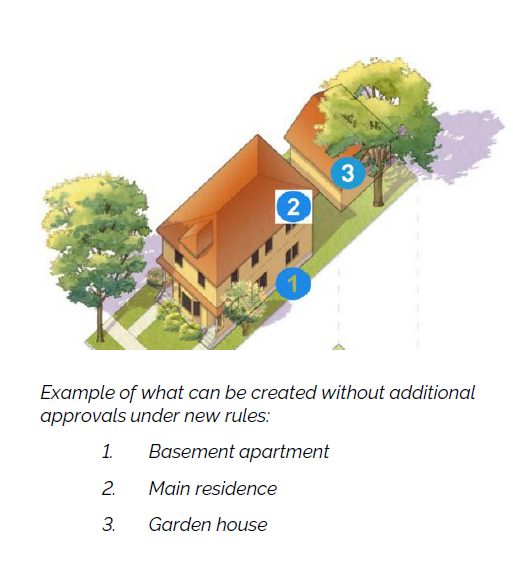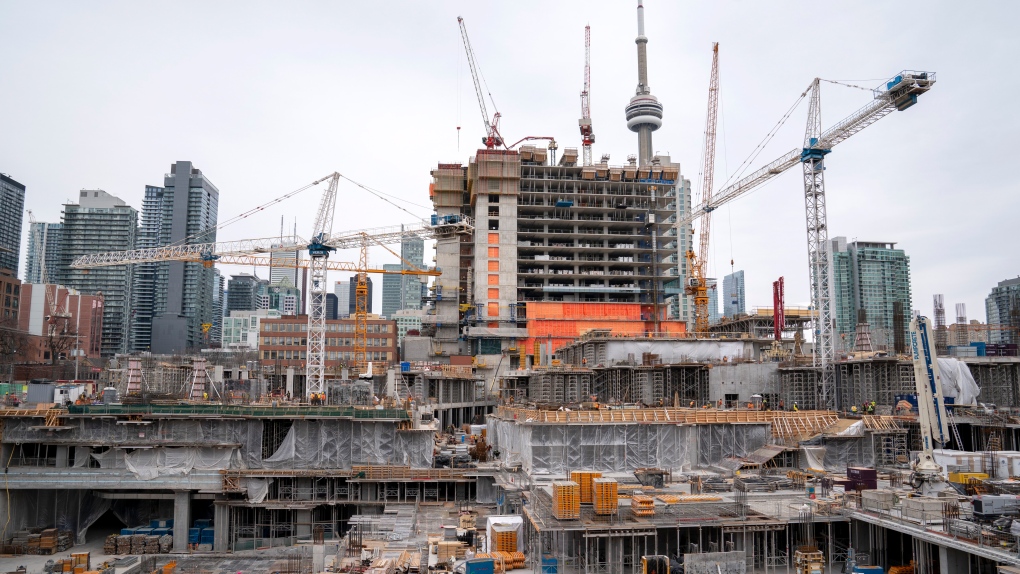Ontario announces sweeping housing changes that allow three units on one property
The Ontario government announced sweeping housing changes on Tuesday that will override municipal zoning laws in some situations and allow for the construction of up to three units on each residential lot.
Elements of the new legislation were first presented publicly at a ticketed Toronto Region Board of Trade event attended by Premier Doug Ford and Municipal Affairs Minister Steve Clarke.
Speaking to the crowd, Ford said the third installment of his government’s housing action plan will include “new solutions” that will allow the next generation of Ontarians to own a home.
“There’s no time to waste,” he said. “Previous governments saw the problem coming, but they totally ignored it.”
“You need to have a backbone to go out there and make those tough decisions. Our government will never ignore the many Ontario families who want a place to call home.”
The government tabled a bill Tuesday--called the More Homes, Built Faster Act--including a number of legislative changes and proposals they say will help “build housing faster and bring costs down,” allowing the Progressive Conservatives to meet their goal of building 1.5 million homes in 10 years.
As part of this plan, the PCs will be overriding municipal zoning laws to allow more “missing middle” homes to be built without further planning approvals.
Under the legislation, up to three units will be allowed on a single residential lot without any bylaw amendments or municipal permissions. An example provided by the government shows a basement apartment and garden or laneway house could be built on a property and rented out to tenants. Duplexes and triplexes could also be built on single residential lots, regardless of municipal zoning laws.
The legislation would make it so municipalities can’t set restrictions on unit sizes or require more than one parking space per unit.
 A graphic provided to reporters by the Ontario government shows how its "missing middle" homes legislation can be used.
A graphic provided to reporters by the Ontario government shows how its "missing middle" homes legislation can be used.
These units would be exempt from development charges and parkland dedication fees under the new legislation.
Development charges are fees collected from developers that help pay for the cost of municipal services or impacted infrastructure such as roads and transit.
Officials hope this will create a “broader mix of rental housing.”
The Ontario government has also said it will be assigning housing targets to 29 large municipalities based on population size and growth.
As part of the housing legislation, the City of Toronto will be on the hook for the creation of 285,000 new homes by 2031.
Ottawa has been assigned a housing target of 161,000 while Mississauga has a target of 120,000 and Brampton has a goal of 113,000 homes.
Each city will have to develop “pledges” outlining how they will meet the targets. Clarke would not expand on what would happen if municipalities do not meet their housing goals, saying only that he hopes municipalities will be up to the challenge.
"We'll work collaboratively with those largest communities that we've initiated a housing pledge," he said, adding that housing was a major issue throughout the municipal elections across the province.
As it stands, there is no additional financial investments announced Tuesday to help these municipalities make their goals or to make up the difference lost by the reduction of development charges and fees.
CHANGES IN DEVELOPMENT CHARGES AND FEES
Ontario will also scrap fees—including development charges, parkland dedication levies and community benefit charges—for affordable housing, non-profit housing and “inclusionary zoning units.” This is in addition to reducing development charges up to 25 per cent for family-sized rental units.
Conservation authority fees for development permits will be temporarily frozen.
Government officials said conservation authorities will no longer need to consider factors such as pollution or land conservation when approving permit requirements. Instead development regulations will be streamlined to focus on natural hazards such as flooding and erosion.
They will also streamline the province’s 36 conservation authorities into one agency.
A number of proposals that would allow the government to “streamline processes” to get housing built, including removing the requirement for municipalities to hold public meetings for every development draft plan, focusing site plan reviews on health and safety issues rather than landscaping details, and allowing ministry staff to make certain decisions on aggregate development applications rather than waiting for a minister’s approval.
 A construction site in full swing in Toronto on Wednesday March 18, 2020. THE CANADIAN PRESS/Frank Gunn
A construction site in full swing in Toronto on Wednesday March 18, 2020. THE CANADIAN PRESS/Frank Gunn
The province says it will also limit third-party appeals at the Ontario Land Tribunal for official plan amendments, zoning bylaw amendments, as well as “minor variances and consents.” This includes appeals made by individuals or community groups not directly involved in the development case.
The government says this will speed up approvals and reduce caseloads at the tribunal.
Clarke said residential associations or environmental groups can still make appeals through city council.
"We're past the point of NIMBYs," he said. "We're no in 'not in my backyard.'"
"You can't continue to do the same thing."
While the PCs are reducing a number of fees, they are also increasing fines for “bad actors” who terminate contracts or cancel projects such as pre-construction homes.
If approved, this proposal would increase the maximum penalties from $25,000 to $50,000 and allow the proceeds to be directed to consumers adversely affected by the decision.
These new changes come the same day the government raised the non-resident speculation tax on homes purchased by foreign nationals from 20 per cent to 25 per cent—the highest tax rate in Canada.
The tax hike goes into effect today.
The New Democratic Party, meanwhile, said they were concerned about whether the legislation tabled will build enough affordable housing compared to what the province is calling "attainable housing."
"It does seem like this bill is good for building new homes. We have some questions about whether this bill will build affordable homes," MPP Jessica Bell told reporters.
"We have some questions about whether this bill will enable municipalities to provide the services that are necessary when new developments come online. And we've got a lot of concerns about what this bill will mean for renters as well as people who are struggling with homelessness"
The housing legislation would go into effect by the summer of 2023 if it passes, the government says.
CTVNews.ca Top Stories

Trump threatens to try to take back the Panama Canal. Panama's president balks at the suggestion
Donald Trump suggested Sunday that his new administration could try to regain control of the Panama Canal that the United States “foolishly” ceded to its Central American ally, contending that shippers are charged “ridiculous” fees to pass through the vital transportation channel linking the Atlantic and Pacific Oceans.
Man handed 5th distracted driving charge for using cell phone on Hwy. 417 in Ottawa
An Ottawa driver was charged for using a cell phone behind the wheel on Sunday, the fifth time he has faced distracted driving charges.
Wrongfully convicted N.B. man has mixed feelings since exoneration
Robert Mailman, 76, was exonerated on Jan. 4 of a 1983 murder for which he and his friend Walter Gillespie served lengthy prison terms.
Can the Governor General do what Pierre Poilievre is asking? This expert says no
A historically difficult week for Prime Minister Justin Trudeau and his Liberal government ended with a renewed push from Conservative Leader Pierre Poilievre to topple this government – this time in the form a letter to the Governor General.
opinion Christmas movies for people who don't like Christmas movies
The holidays can bring up a whole gamut of emotions, not just love and goodwill. So CTV film critic Richard Crouse offers up a list of Christmas movies for people who might not enjoy traditional Christmas movies.
More than 7,000 Jeep SUVs recalled in Canada over camera display concern
A software issue potentially affecting the rearview camera display in select Jeep Wagoneer and Grand Cherokee models has prompted a recall of more than 7,000 vehicles.
'I'm still thinking pinch me': lost puppy reunited with family after five years
After almost five years of searching and never giving up hope, the Tuffin family received the best Christmas gift they could have hoped for: being reunited with their long-lost puppy.
10 hospitalized after carbon monoxide poisoning in Ottawa's east end
The Ottawa Police Service says ten people were taken to hospital, with one of them in life-threatening condition, after being exposed to carbon monoxide in the neighbourhood of Vanier on Sunday morning.
New York City police apprehend suspect in the death of a woman found on fire in a subway car
New York City police announced Sunday they have in custody a “person of interest” in the early morning death of a woman who they believe may have fallen asleep on a stationary subway train before being intentionally lit on fire by a man she didn't know.


































